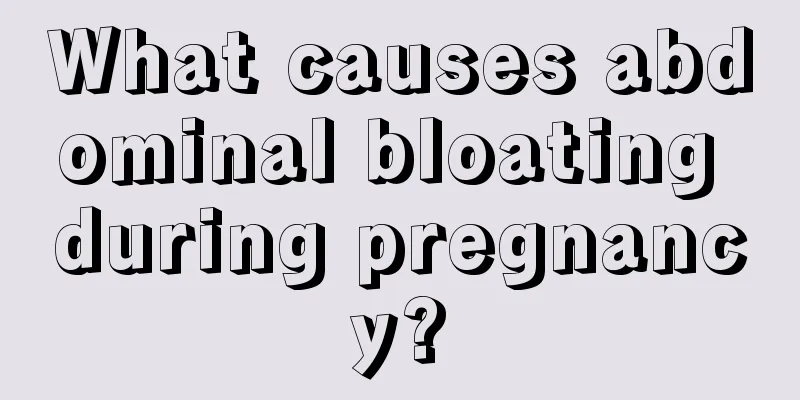What causes belly pain in pregnant women?

|
Pregnant women's bodies will undergo major changes after pregnancy, among which the most obvious are the enlargement of the belly and the increase in body fat. Some pregnant women may face greater health threats and experience some symptoms that cause physical pain. For example, abdominal pain is one of the most common symptoms, and it is becoming more and more common for pregnant women to experience this condition. Let's take a look at what causes abdominal pain in pregnant women. reason: 1. Physiological abdominal pain As the baby grows, the expectant mother's uterus also gradually expands. The enlarged uterus constantly stimulates the lower edge of the ribs. In the late stages of pregnancy, expectant mothers may sometimes experience lower abdominal pain due to false labor when resting at night. The pain usually lasts only a few seconds, with intervals of up to several hours. It is not accompanied by a feeling of falling, and the symptoms will be relieved during the day. 2. Pathological abdominal pain Placental abruption: It often occurs in the late pregnancy. The expectant mother may have pregnancy-induced hypertension syndrome, chronic hypertension, or abdominal trauma. Tearing pain in the lower abdomen is a typical symptom, often accompanied by vaginal bleeding. The degree of abdominal pain is affected by a combination of factors such as the size of the abruption area, the amount of blood, the internal pressure of the uterus, and whether the uterine muscle layer is damaged. In severe cases, the abdominal pain is unbearable, the abdomen becomes hard, the fetal movement disappears, and even shock may occur. Therefore, in the late stages of pregnancy, expectant mothers with high blood pressure or abdominal trauma should go to the hospital in time to prevent accidents. If an expectant mother suddenly feels persistent severe pain in the lower abdomen, it may be premature birth or a sign of uterine rupture. You should go to the hospital for treatment in time and do not delay. Countermeasures: If expectant mothers experience paroxysmal lower abdominal pain or regular abdominal pain, back pain, or pelvic pain in the first few months of pregnancy, the problem may be more complicated. If it is accompanied by vaginal spotting or a noticeable feeling of abdominal heaviness, it may indicate threatened miscarriage. Expectant mothers should move less, stay in bed more, avoid sexual intercourse, avoid lifting heavy objects, drink water, and seek medical attention promptly. If pain worsens or bleeding continues, seek medical attention immediately. If you experience severe unilateral lower abdominal pain, accompanied by vaginal bleeding or fainting, it may be an ectopic pregnancy and you should go to the hospital immediately. |
>>: Constipation and anal swelling in pregnant women
Recommend
Is postpartum hair loss normal?
Generally, mothers may find some adverse reaction...
Menstruation is about to end and bleeding
In clinical medicine, some female friends will ex...
What symptoms did a woman have before she became pregnant?
Speaking of pregnancy, since pregnancy is not kno...
How to regulate women's internal heat
It is a common phenomenon for girls to have exces...
Can I do ovarian maintenance if I have uterine fibroids?
In today's high-pressure life, more and more ...
What causes uterine odor?
The odor in the uterus also refers to the odor in...
Folic acid dosage for pregnant women
Folic acid is a very special vitamin in the human...
Daily care for intermittent menstruation
What should I do if my menstruation is intermitte...
The role of powder
There are many things that women need to use when...
Increased leucorrhea before menstruation is a sign of pregnancy
Some people are eager to get pregnant, and when t...
How many weeks is a good time to screen blood sugar?
After pregnancy, different examinations need to b...
Signs of pregnancy in the first month
Regardless of whether a woman has had pregnancy e...
What are the causes of moderate inflammation of cervical erosion?
Speaking of cervical erosion, I believe many midd...









